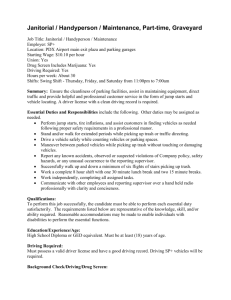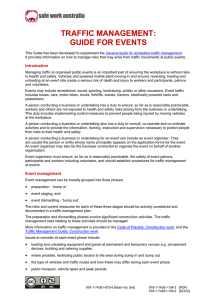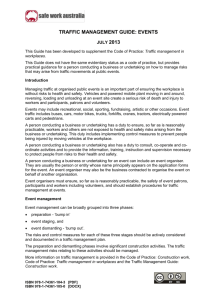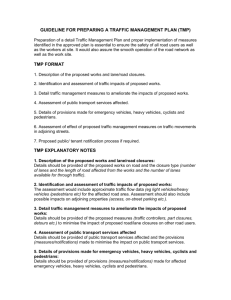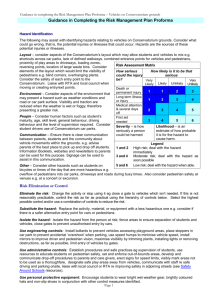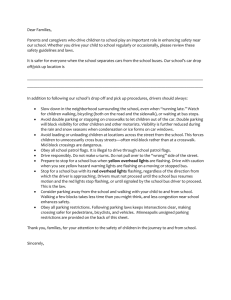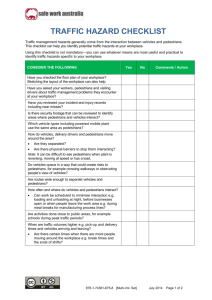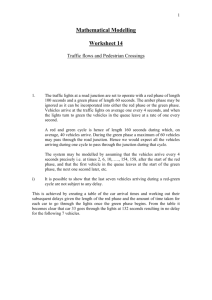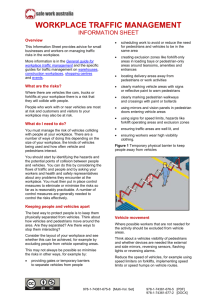Vehicle movements on University sites risk assessment
advertisement
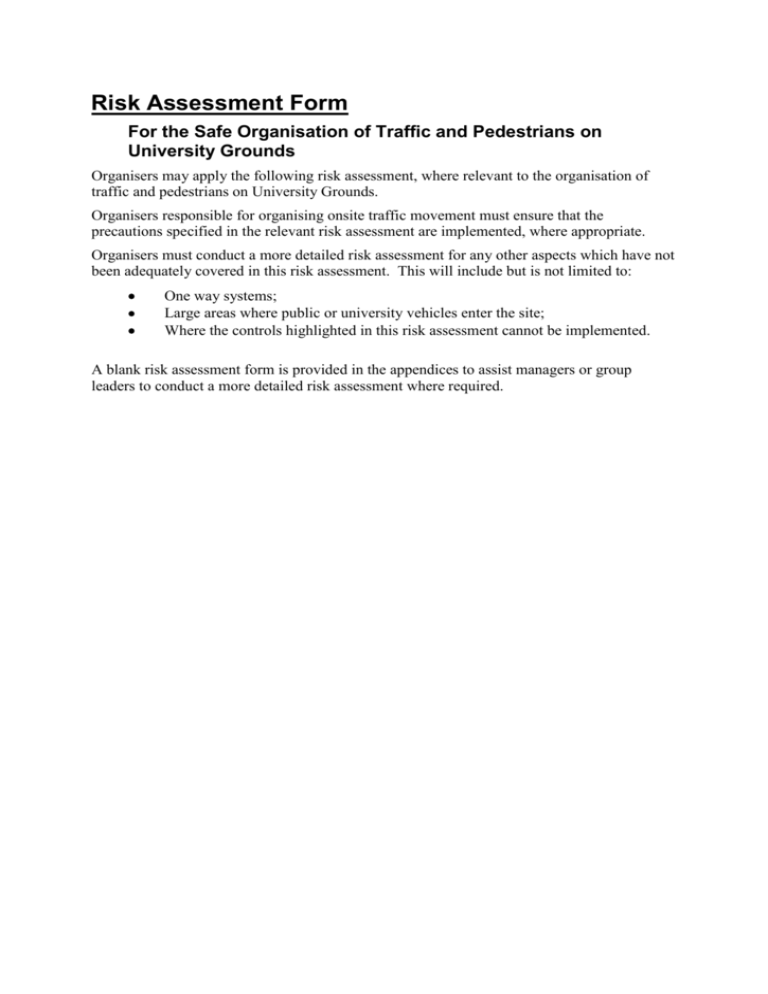
Risk Assessment Form For the Safe Organisation of Traffic and Pedestrians on University Grounds Organisers may apply the following risk assessment, where relevant to the organisation of traffic and pedestrians on University Grounds. Organisers responsible for organising onsite traffic movement must ensure that the precautions specified in the relevant risk assessment are implemented, where appropriate. Organisers must conduct a more detailed risk assessment for any other aspects which have not been adequately covered in this risk assessment. This will include but is not limited to: One way systems; Large areas where public or university vehicles enter the site; Where the controls highlighted in this risk assessment cannot be implemented. A blank risk assessment form is provided in the appendices to assist managers or group leaders to conduct a more detailed risk assessment where required. University Safety Policy Supplement – Safety in Transportation Newcastle University Risk Assessment Title of project or activity Responsible person / Manager School Date of assessment Location of work (Buildings and room numbers) [ENTER DETAILS HERE] [ENTER DETAILS HERE] [ENTER DETAILS HERE] dd/mm/yyyy [ENTER DETAILS HERE] Introduction The following risk assessment/guidance has been developed to assess the hazardous activities, risks and identify appropriate control measures to reduce them. A simple implementation check is provided to assist schools in demonstrating that the control measures are being implemented. Please identify when they have been implemented or when it is non applicable. Please refer to the Safety in Transportation Supplementary Safety Policy. Activities with Hazardous Potential and Significant Risks are contained within the shaded area. The First shaded area in the assessment identifies the hazard or hazardous activity and the second identifies the risks imposed by that activity. Preventative and Protective Measures to Reduce Risks to an Acceptable Level (or Avoid Them Altogether) are contained within the un-shaded areas. This section identifies the control measures required and may require schools to choose options or carryout additional risk assessments. Help and Support Safety Office Occupational Health Unit Hazard 1 Schools must visit the University Safety Office Website. The website contains a wide range of guidance which will assist schools manage health and safety effectively including University Safety Policies and Supplements, Safety Guidance, Training, Forms, etc. Vehicle and Pedestrian Movements / Organisation on University Grounds Implemented Date N/A Potential Risks are to employees, students and any other person who could be affected by University activities. The potential risks are: Risks Control Measures Collisions with vehicles, pedestrians or other objects, potentially causing death or severe injury to the driver, University employees, students and members of the public. Being struck by heavy items unsecured to vehicles. Schools are responsible for managing and controlling vehicles on their premises and other locations within their control. Schools must consider and implement the following control measures which are appropriate to their road layouts. All schools should contact and discuss layouts with the Estates Service. An additional risk assessment on the road layout must be carried out where the controls below do not Page 2 of 3 University Safety Policy Supplement – Safety in Transportation adequately control the potential risks from vehicles and traffic movement. Separate routes for pedestrian and vehicles by the provision of adequate pavements. Barriers or bollards must only be used where necessary, e.g. short duration works or an event is taking place. Designated signed crossing points must be in place for areas where crossings are heavily used. Where movement restriction is not practical Schools must ensure appropriate warning notices are affixed at the entry to grounds identifying pedestrian movement, e.g. parking areas. Loading areas/bays should be free of parking and signed appropriately. They should be large enough to accommodate the required numbers of vehicles and where space is minimal loading should be carried out one at a time. Good visibility (e.g. good lighting, provision of mirrors where necessary) and roadways are marked appropriately. Avoidance of reversing and where not practical use of one way systems and roundabouts. Adequate speed restrictions by the use of physical measures (speed bumps) and signage. All surfaces used by traffic and pedestrians, including parking, should be clear of obstacles, tripping and slipping hazards. All walkways should be gritted and cleared during the winter months to minimise the effects of ice and snow. In addition all wet leaves, moss, etc must be cleared from all routes. There is sufficient parking for visitors and contractors on site. Use separate routes for vehicles and pedestrians or use of vehicle and pedestrian exclusion zones where required to segregate them. Please also refer to the Estates Service Contractors Parking Policy. Schools must monitor control measures and intervene with anyone who fails to comply with safety precautions and report these occurrences to University Security. Schools must also see the University Code ‘Safety in Transportation’; this provides instruction and risk assessments for schools to use. Schools must conduct a more detailed risk assessment for any journey involving the transport of students, visitors or any aspect of the journey which presents a significant risk not covered by a general risk assessment. Responsible person / Manager Name Signature Date [ENTER HERE] [ENTER HERE] [ENTER HERE] Page 3 of 3

